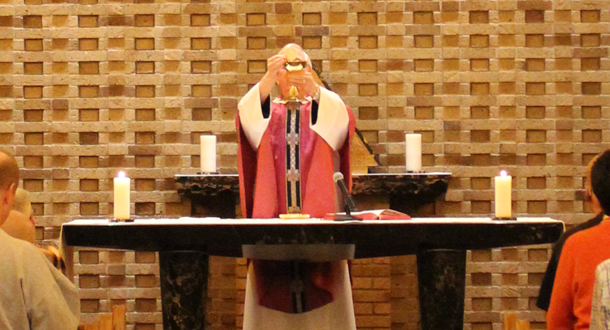
Scripture:
Joshua 24:1-2a, 15-17, 18b
Ephesians 5:21-32 or 5:2a, 25-32
John 6:60-69
Reflection:
Our Gospel reading for Sunday (John 6:60-69) marks the end of the Bread of Life Discourse which we have been reading over the past few weeks. And, perhaps surprisingly, it doesn’t end with Jesus triumphantly convincing many people about who He was and why He was there. Many people who had accompanied Him were now leaving Him, because they couldn’t understand all the talk about Jesus as the living bread that came down from heaven, or about whoever didn’t eat of His flesh and drink of His blood not having eternal life. They say, “This saying is hard; who can accept it?”
What follows is a demonstration of Jesus’ humanity, and an occasion where Peter actually comes off quite well. When Jesus sees all the people leaving Him, He turns to the Twelve and asks, “Do you also want to leave?” And Peter, without the usual bravado or air of self-importance, simply says, “Master, to whom shall we go? You have the words of eternal life. We have come to believe and are convinced that you are the Holy One of God.”
If we read further in John’s Gospel, we see that neither Peter nor the rest of the Twelve completely understood what Jesus was talking about, but they were willing to stick with Him when others were leaving.
Are we willing to stick with Jesus even though we may not completely understand what He’s saying to us, or as may be more often the case, we do understand, but we don’t necessarily like it?
If we do believe that Jesus is the Holy One of God, and we do believe that He has given us the words of eternal life, we are called once again, to consider our response.
When we celebrate the Mass, and listen to God’s word, and take in Jesus’ total gift of Himself, are we really supposed to give in to despair about ourselves, or give in to self-righteousness about others? Or do we come humbly before God, accepting God’s love for us in Jesus Christ, and striving to love as He loves? This does not mean we forego working for justice, but while we may condemn injustice, we leave the condemnation of others to God.
In the words of Joshua in our first reading (Joshua 2:1-2a, 15-17, 18b), may we “serve the Lord,” not the current trend of contempt for the “other.” In the words of St. Paul in our second reading (Ephesians 5:21-32), may we “be subordinate to one another out of reverence for Christ;” for He does have the “words of eternal life.”
Fr. Phil Paxton, C.P., is the local superior of the Passionist Community in Birmingham, Alabama.
